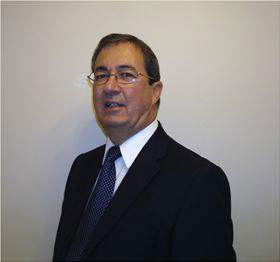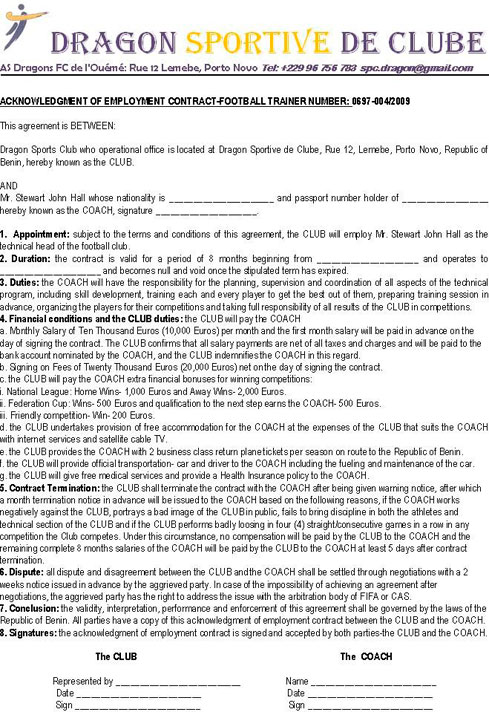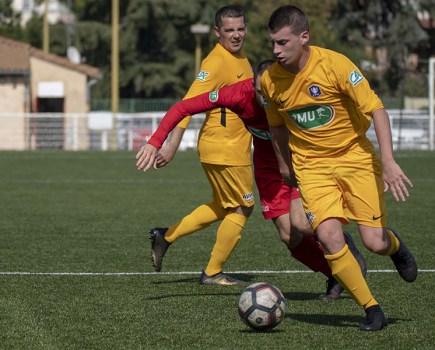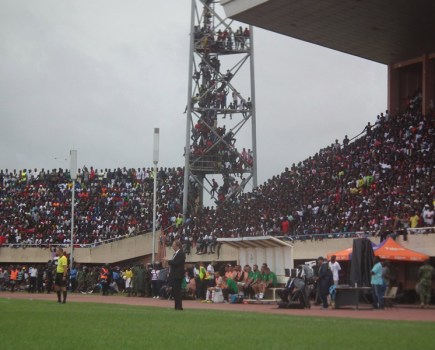 Peter Conning is not a regular Web user, but the former Weymouth and Yeovil player and now licensed agent has recently realised he has a significant social media presence.
Peter Conning is not a regular Web user, but the former Weymouth and Yeovil player and now licensed agent has recently realised he has a significant social media presence.
“Myself and several close friends and work colleagues identified that when my name was Googled numerous links highlighted a football agent working to bring players to UK for trials with UK clubs,” says Conning, who represents a number of players in England, including Nikica Jelavic of Everton and Croatia.
Bringing players to the UK for a trial is hardly odd, but Conning realised that people trying to pass themselves off as him were involved in Internet scams. To give themselves credibility, they were stealing his identity through fake profiles on social media sites and trying to swindle unwitting players out of money for non-existent trials.
A frustrated Conning says: “Even though numerous links were primarily to websites that were not household names there was Facebook, Twitter and LinkedIn accounts using my name and an old photo. FIFA and the FA have a responsibility to ensure that professional agents are protected and the ambitious footballer is not ‘conned’.”
The scammers are able to do all this is due to a weakness in FIFA’s official agents’ directory, which is published on the Internet.
Since 2001, agents have been licensed not by FIFA but by the national association in the country where they live. That association is then responsible for providing contact details, including a postal address, phone number and email address to FIFA, which publishes the details online in a directory.
For a significant number of agents, there are no phone and email contact details listed. This allows criminal gangs to use this absence of contact information to create false identities on social media that are strikingly similar to legitimate agents.
Typically, the scammers reverse the first and last names of real agents to create a bogus identity. In a bitterly ironic but probably unwitting twist to this particular con, the scammers created a fake agent calling Conning Peter.
Once a fake identity is created, the scammers use social media to contact players about potential trials, usually in Europe. If the players respond, the scammers use mocked-up headed paper from well-known clubs to offer a trial. Once the players are taken in, the scammers request a fee of around £500 to cover ‘insurance’. If this is paid, the scammers then vanish into the ether.
“All trials should be free, you should never pay,” says Zeph Thomas, the St Kitts international whose long career has taken him from England and Scotland to Belgium and the United States.
These scammers have even created a fake online agency Cadmens to try and dupe potential victims, who are usually aspiring young footballers from developing countries, often with a limited command of English.
In April this year, World Soccer revealed the extent of the problem and how 42 of FIFA’s members have failed to provide a telephone number or email to FIFA for one or more of the agents they have licensed. In total, 179 of the agents in the online directory on Fifa.com were then contactable solely by postal address.
Six months on and FIFA has not only taken no action but the problem actually appears to be getting worse.
There are now 227 agents from 38 different associations listed in FIFA’s directory with no email or telephone contact details. Some of these individual agents work for larger agencies or other bodies and tracking them down and confirming their identity can be done relatively easily. Many are not.
The only way to contact these representatives is to write them a letter or actually pay them a visit. Writing letters – as the scammers know – is hardly in vogue amongst young footballers, while travelling across the world to confirm someone’s identity is not practical.
Michael Hart, for example, is the first licenced agent to operate out of Curaçao. Anyone wanting to track him down would need to travel to the Dutch controlled Caribbean island and visit him at the sketchy address provided on FIFA’s website: Sorzaka, Kavel U3.
These sorts of problems are rife. There are still no email or telephone contact details for any of the licensed agents in Gabon. In Honduras, there are only two agents licenced to operate by the Federación Nacional Autónoma de Fútbol de Honduras. Neither is contactable by telephone or email and there is not even a postal address for one of this duo, Eduardo Alfredo Pedemonte Lara.
Even in some cases where there are more details, they are often generic emails, such as Hotmail. The email address for one Italian agent is: worldsoccer73@hotmail.it.
These gaps are what left Vurlon Mills conned out of £500 for a non-existent trial with an English Championship side after the Guyana striker was taken in by scammers posing as Spanish agent Jose Navarro Aparicio.
This lack of governance also leaves agents open to the sort of identity theft that has plagued Peter Conning and others.
Peter Conning did contact LinkedIn and receive a response but his fake account remains on the website. LinkedIn did not respond to requests for a comment on the proliferation of fake agents on its site. Twitter explained that it was unable to comment on individual accounts, but said that impersonation was against its rules, and pointed to its process for reporting violations’.
The FIFA directory has been updated since World Soccer’s original expose. Some individual agents have made efforts to prevent identity theft, such as Barry McIntosh, the notoriously low-profile agent based in the Cayman Islands. Full contact details for McIntosh are now on FIFA.com.
Some countries have also improved. Six months ago, 21 of the 76 agents licenced by the Russian federation were uncontactable by email or phone; now that number has been reduced to just three players’ representatives.
However, more agents are still being added to the directory, including a surge of uncontactable Italian agents, which creates yet more opportunities for the scammers.
Six months ago, FIFA.com listed 937 agents licenced by the Italian association, the FIGC, with 55 only contactable by address. Research carried out this month showed 1,059 agents licenced and based in Italy. The number uncontactable by email or phone has spiralled to 129. Some agents are listed as care of the FIGC. Many are not. When World Soccer asked the FIGC for an explanation, no reply was received.
In France, the number of licenced agents has fallen from 269 over the last six months ago to 243 in October but 32 are still only listed with a contact postal address. After Italy and France, the country with the largest number of licenced agents open to identity theft is England, where 10 players’ representatives only have postal addresses listed.
Peter Conning is not alone in having his identity hijacked by social media. So has Minehead-based Digby Reed. On LinkedIn and Facebook there are a number of profiles for a Reed Digby, most claiming to be a licenced football agent and many linked to the phantom agency Cadmens.
Facebook said that profiles for Reed Digby and Conning flagged up as bogus by World Soccer had been removed.
“On Facebook people connect using their real names and identities,” said a Facebook spokesperson. “We ask that [users] refrain from publishing the personal information of others without their consent. Claiming to be another person, creating a false presence for an organization, or creating multiple accounts undermines community and violates Facebook¹s terms.”
A number of other bogus profiles using the names of Reed Digby and Conning Peter remain on Facebook, which asked World Soccer to provide links even though they can all be easily identified with a brief search of the social media site.
The other eight English agents listed on FIFA’s directory without email or phone contacts all appear to have had their identities hijacked on Facebook or some other form of social media. These include Anthony Clachar, whose real Twitter handle is @Official agent. On Twitter, Clachar describes himself as: “Football Agent licensed by THE FA. Die hard mufc fan for life. I do not have a Facebook account any profile under my name as an agent is a fraud.”
FIFA insist that responsibility for contact details on the site is the responsibility of national associations. World Soccer asked the FA if it planned to ensure all English registered agents supply authentic email and telephone numbers for publication on FIFA’s directory to prevent identity fraud. No response was received.
Vulnerable but ambitious players and legitimate agents are not the only ones being targeted by the conmen, who British police believe are based in Latvia, Nigeria or Romanian. Managers are also being targeted, particularly those working abroad where even legitimate offers of work can be in poorly worded English.
The extent of the problem is so large that even genuine agents are being caught out. Stewart Hall has been offered a number of spurious deals in a long career that has involved the Englishman working in Africa, the Caribbean and India. Now out-of-work, Hall was recently offered a contract for a job in Benin (see below) by an authentic licensed agent who had been taken in.
Hall says: “We applied and [I was] offered the job, when I was about to accept they asked for U$D 400 for a safety certificate; this had to be paid by me. The agent said surely this can’t be a scam for just U$D 400 but I said if they offer this deal to 10 coaches its U$D 4,000. I still don’t know if it was a real deal.”
In one recent fake job offer, Hall was offered €120,000 to work in Uganda. He adds: “One thing common in all of these scams is that the jobs are vastly overpriced to get you to bite.”
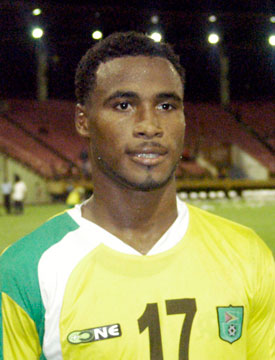 In a poignant coda to this whole sorry saga, after Vurlon Mills’ travails were exposed by World Soccer in April the ambitious Guyana striker finally succeeded in landing a professional contract abroad.
In a poignant coda to this whole sorry saga, after Vurlon Mills’ travails were exposed by World Soccer in April the ambitious Guyana striker finally succeeded in landing a professional contract abroad.
Not long after Mills (pictured left) began playing in Trinidad & Tobago’s TT Pro League, one of his new team-mates, Travis Joseph, mentioned that he had had been contacted about a potential trial in Europe. That contact came via Facebook and was from a licenced Spanish agent called … Navarro Aparicio Jose.
Like many in the football game taken in by these elusive scammers, Mills remains frustrated that FIFA’s agents’ directory remains a playground for criminals and wants change.
He says: “I would like to see FIFA police the fifa.com website far better than they are presently. Each and every agent registered should only appear on the FIFA website if they disclose full information including full business address, telephone number, email and now a photograph and any data on past deals they have done so far as an agent.
“This information should be checked randomly by FIFA and be updated yearly. Subject to this information not being submitted means that agents details not appearing on the website. This hopefully will prevent fraud agents from taking money upfront from young players and making off with the cash.”
This is part of a presentation being made by Steve to the Play The Game conference in Denmark. It is being streamed live by the Danish Broadcasting Corporation. If you would like to watch a live stream of the presentation, you can find it by clicking here.
LINKS
| The Uncontactable Agents – Agents on Fifa.com with no telephone or email contacts | |||||||
| Country | Total licenced agents | Uncontactable Agents | |||||
| France | 243 | 32 | |||||
| Italy | 1059 | 129 | |||||
| England | 452 | 10 | |||||
| Gabon | 5 | 5 | |||||
| Netherlands | 5 | ||||||
| United States | 163 | 4 | |||||
| Argentina | 216 | 3 | |||||
| Russia | 76 | 3 | |||||
| Bosnia-Herzegovina | 111 | 2 | |||||
| Brazil | 265 | 2 | |||||
| Guinea Bissau | 39 | 2 | |||||
| Honduras | 2 | 2 | |||||
| Surinam | 7 | 2 | |||||
| Tunisia | 30 | 2 | |||||
| Belgium | 93 | 1 | |||||
| Cameroon | 38 | 1 | |||||
| Central African Republic | 18 | 1 | |||||
| Chile | 18 | 1 | |||||
| Congo | 23 | 1 | |||||
| Cote d’Ivoire | 29 | 1 | |||||
| Croatia | 44 | 1 | |||||
| Curaçao | 1 | 1 | |||||
| Denmark | 42 | 1 | |||||
| Germany | 426 | 1 | |||||
| Guinea | 18 | 1 | |||||
| Indonesia | 14 | 1 | |||||
| Japan | 30 | 1 | |||||
| Mali | 47 | 1 | |||||
| Norway | 27 | 1 | |||||
| Poland | 68 | 1 | |||||
| Qatar | 9 | 1 | |||||
| Scotland | 71 | 1 | |||||
| Senegal | 33 | 1 | |||||
| Slovenia | 31 | 1 | |||||
| Spain | 578 | 1 | |||||
| Uganda | 5 | 1 | |||||
| Ukraine | 67 | 1 | |||||
| Uruguay | 52 | 1 | |||||

